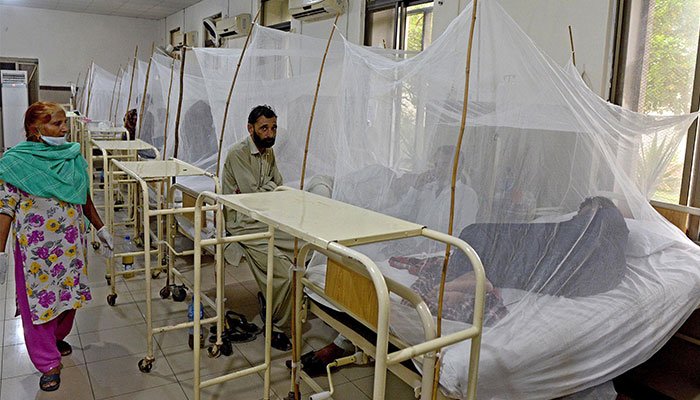[ad_1]
- NIH says “no new variant of dengue virus has been reported, it is just a hoax.”
- Leading infectious diseases experts claim presence of four serotypes of vector-borne disease.
- Say unprecedented rains and consequent floods resulted in 100% increase in dengue cases.
As dengue tightens its grip on Pakistan, the National Institute of Health, Islamabad (NIH) dismissed reports of the emergence of any new strain, terming it a “hoax”.
However, leading infectious diseases experts claimed the presence of four serotypes of the vector-borne disease, saying that “a mix of dengue serotypes’ could be affecting people in Pakistan.
“No new variant of dengue virus has been reported, it is just a hoax,” an official of the NIH Islamabad said in response to a question about the emergence of new dengue variants bring the reason behind severe illnesses affecting people, The News reported.
Some experts as well as Federal Minister for Climate Change Sherry Reman linked the recent dengue outbreak to climate change, saying unprecedented rains and consequent floods had resulted 100% increase in dengue cases, especially in Karachi and other cities of Sindh, where it rained continuously for over two and a half months.
Another expert, Prof Dr Saeed Khan of the Dow University of Health Sciences (DUHS), Karachi, said there were only four serotypes of dengue virus last year.
“Actually, when a man is infected with one serotype, he develops antibodies for that particular type. But when the same person is infected with another serotype, he or she gets severely sick because the existing antibodies of previous serotypes help the newly-entered virus to infect the person,” he added.
Prof Dr Iqbal Chaudhry from HEJ Research Institute, University of Karachi, and Dr Faisal Mehmood from the Aga Khan University also denied reports of any new variant of dengue virus. Dr Faisal said the dengue cases were constantly on the rise in Karachi, adding that the peak of dengue season had yet to come as historically cases touch peak in the month of October.
Prof Ishtiaq Ahmed, another researcher associated with HEJ Research Institute of Chemistry, said viruses mutate with the passage of time and dengue is also a highly mutating virus, lags behind only HIV and influenza in this race. “However, it is early to conclude that a typical mutation is leading to severe infections,” he added.
Commenting over severe disease being caused by the dengue virus this year in Karachi and other parts of Sindh, he said:
“I think our relatively larger population has probably infected by one serotype and now the people, who are being infected by second serotype are showing severe symptoms. With increase in infection and re-infection rate, we will see more cases of severe dengue and God forbid severe outcome.”
On the other hand, hundreds of new dengue cases were reported from Sindh, Punjab, Islamabad as well as Khyber Pakhtunkhwa, compelling authorities to take preventive measures to control the spread of the vector-borne disease. In Sindh around 388 new dengue cases were reported in last 24 hours, including 324 cases from Karachi alone, where two people died due to the complications of dengue fever, officials said, adding that they have started converting the Covid-19 high dependency units at major hospitals into the dengue treatment centres.
Interestingly, only 188 dengue cases were reported in Punjab during the past 24 hours, including 80 from Rawalpindi, 62 from Lahore and remaining from other cities, indicating the disease surveillance system was allegedly not functioning properly in the province, where hundreds of people were daily approaching healthcare facilities for the treatment of dengue fever.
The officials in Khyber Pakhtunkhwa claimed that 307 new cases were reported during the last 24 hours, including 153 from Peshawar followed by Mardan, where 73 new cases were reported, adding that so far 5 people have lost their lives due to dengue fever in KPK province.
Around 179 cases of dengue fever were reported from Islamabad Capital Territory (ICT), while over 150 cases of dengue fever have been reported from different districts of Balochistan, the officials said.
[ad_2]

